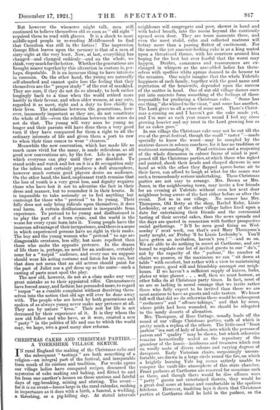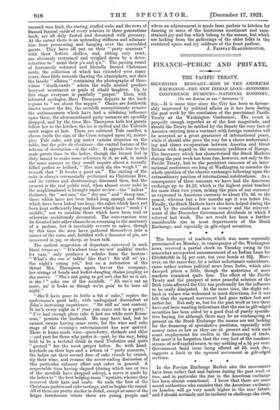CHRISTMAS CAKES AND CHRISTMAS PARTIES.— A YORKSHIRE VILLAGE SKETCH.
IN rural England the making of the Christmas cake and the subsequent " tastings " are both something of a religion—an integral part of the festival, and inseparable from much of its custom and tradition. For weeks agone our village ladies have compared recipes, discussed the mysteries of cake making and baking, and flitted to and fro from one another's houses on those anxious and fateful days of egg-breaking, mixing and stirring. The event— for it is an event—looms large in the rural calendar, ranking in importance as it does with a birth, a funeral, a wedding, a threshing, or a pig-killing day. At stated intervals neighbours will congregate and peer, skewer in hand and with bated breath, into the recess beyond the cautiously opened oven door. They arc tense moments these, and even the most stolid, calm and collected matrons will betray more than a passing flutter of excitement. For the nonco the yet anaemic-looking cake is as a king seated upon a threatened throne, with his courtiers around him hoping for the best but ever fearful that the worst may happen. Doubts, assurances and reassurances are ex- changed in whispers as the assembled ladies fan them- selves with spotless white aprons donned to do honour to the occasion. One might imagine that the whole Yuletide happiness of each family, together with the good name and reputation of the housewife, depended upon the success of the matter in hand. One of our old village dames once put into concrete form something of the feelings of those responsible for producing a Christmas cake. " Some has one thing," she whined to the vicar, " and some has another. The Lord gives us all a cross of some sort. There's Christ- mas a-coming on and I haven't got the cake made yet, and I'm sure as each year comes round I feel my cross growing heavier and my trust in the Lord growing less so far as cakes goes."
In our village the Christmas cake may not be cut till the eve of the great festival, though the small " taster "—made specially to know the worst--may be sampled by the anxious dames in solemn conclave, for it has no tradition or sentiment surrounding it. Final criticism and a reopening of the whole discussion in calmer frame of mind is post- poned till the Christmas parties, at which those who sighed and panted, shook their heads and clasped skewers in one hand as with the other they flapped apron-borne air to their faces, can afford to laugh at what for the nonce was such a tremendously serious undertaking. These Christmas parties are not easy to arrange. Mrs. Brown or Mrs. Jones, in the neighbouring town, may invite a few friends for an evening at Yuletide without even her next door neighbour being aware of the fact either before or after the event. Not so in our village. No sooner has Mrs. Thompson, Old Betty at the shop, Rachel Raby, Lizzie Leckonby, or any of the other village ladies fixed upon a date for entertaining their friends and the ceremonial tasting of their several cakes, than the news spreads and the days are quoted in connexion with further prospective social gatherings. " It'll be neea good fixing on Wed- nesday i' next week, coz that's awd Mary Thompson's party neeght, an' Friday '11 be Lizzie Leckonby's. You'll have getten an invitation, haven't you ? "—and so on. We are able to do nothin.l' in secret at Carthorse, and are bound to regulate our list of invited guests to our " do's," not by the capacity of the " parlour," the number of chairs we possess, or the maximum we can " sit down at table " with comfort, but rather with a view to maintaining future peace, good will and friendship amongst our neigh- bours. If we haven't a sufficient supply of knives, forks, plates or wine glasses . . . well, then we must borrow, as other folks do at Christmas party times. In fact, most of us are so lacking in moral courage that we invite rather those who fully expect to be invited than those we are most anxious to have as guests and cake tasters. We know full well that did we do otherwise there would be subsequent " coolnesses" and "offence-takings," and that by some, whose pride had been wounded, we should be relegated to the sandy deserts of alienation. Mrs. Thompson, of Rose Cottage, usually leads off the round of our village Christmas parties, each of which is pretty much a replica of the others. The little-used "front parlour " is a sort of holy of holies, into which the persons of parson and " quality " may be shown, but which otherwise remains hermetically sealed as the repository of the grandeur of the house—heirlooms and treasures which rest on woolly mats of divers colours and varying degrees of dampness. Early Victorian chairs, surpassingly uncom- fortable, are drawn in a large circle round the fire, on which a brightly burning Yule log seems entirely unable to conquer the vault-like atmosphere of this state chamber. Front parlours at Carthorne are reserved for occasions such as these, and though there would be dire offence were " party " guests not entertained therein, they would be a great deal more at home and comfortable in the spotless kitchens. However, tradition lays it down that Christmas parties at Carthorse shall be held in the parlour, so the encased wax fruit, the staring, stuffed owls, and the rows of framed funeral cards of every relation to three generations back, are all duly dusted and decorated with greenery. At the outset there is an unbending stiffness and adaman- tine frost permeating and hanging over the assembled guests. They have all put on their " party manners " with their festive clothes, and, sitting very erect, are obviously restrained and weighed down by a deter- mination to " mind their p's and q's." The passing round of fearsomely eoloured and liberally frosted Christmas cards, the collection of which has extended over many years, does little towards thawing the atmosphere, nor does the family " albium " containing the photographs of those whose " death-cards " adorn the walls around produce buoyant merriment or peals of ribald laughter. Up to this stage everyone is painfully " proper." Then, with laboured apologies, Mary Thompson departs to the back regions to " see about the supper." Chairs are forthwith drawn nearer the fire, the menfolk surreptitiously remove the antimacassars which have had a subduing influence upon them, the aforementioned party manners are speedily dropped, and by the time Mrs. Thompson bids her guests follow her to the kitchen the ice is melted and the Yuletide spirit reigns at last. There are coloured Yule candles, a cheese (with the sign of the Cross scraped upon it), mince- pies, Yule cake, and pig under various disguises on the table, but the pace de resistance—the central feature of the scheme of decoration—is the cake. It appeals less to the male guests than to the ladies, though the former feel in duty bound to make some reference to it, so ask, in much the same manner as they would inquire about a recently killed porker or bullock, " Hoe mich diz sha weigh ? " or remark that " It lecaks a good un." The cutting of the cake is always ceremonially performed on Christmas Eve, and its virtues and shortcomings discussed then, but the present is the real public trial, when almost every cake in the neighbourhood is brought under review—the " failers " (failures). the " sad uns," the " dry uns " and " damp uns," those which have not been baked long enough and those which have been baked too long; the cakes which have not been kept sufficiently long and those which have " sunk i' t' middle," not to mention those which have been iced or otherwise ambitiously decorated. The conversation may be diverted into other channels on returning to the mortuary of a parlour, but it inevitably reverts to cakes, though by this time the men have gathered themselves into a corner of the room and, fortified with a decanter of gin, are immersed in pig, or sheep, or beast talk.
The earliest suggestion of departure, conveyed in such blunt terms as : " It's aboot time we wer' makkin' tracks for yam," only produces a rebuke from the hostess : " What's the use o' talkin' like that ? Sit still wi' ya ; the night's young yet," but on a reiteration of the threat Mrs. Thompson again leaves the company, her strings of beads and locket-dangling chains jangling as she moves. " Sha's not going to get owt else for us ti eat, is sha ? " asks one of the menfolk. " Ah can't eat na more, an' it looks as though we're goin' to be here all night."
" She'll have gone to fettle a bit o' cake," replies the spokesman's good lady, with undisguised discomfort at John's increasing impatience. " Sit still an' rest content. It isn't every night in t' year you come out to a party." " I've had enough plum cake ti last me while next Kessa- mus," persists the husband. He may have had, but ho cannot escape having some more, for the wine and cake stage of the evening's entertainment has now arrived. There is home-made wine—gooseberry, rhubarb and elder —and port for those who prefer it—port, by the way, being held to be a teetotal drink in rural Yorkshire and quite " genteel " for the most proper ladies. So, with hand- kerchiefs on their laps and a return of " party manners," the ladies eat their second dose of cake crumb by crumb, sip their wine, and resume the never-ending discussion of this particular culinary effort and cakes in general. A respectable time having elapsed (during which one or two of the menfolk have dropped asleep), a move is made by the ladies to " the best lodging-room " upstairs, whence they removed their hats and coats. So ends the first of the Christmas parties and cake tastings, and so begins the round. All of them are pretty similar in detail, except at some of the larger farmhouses where there are young people and where an adjournment is made from parlour to kitchen for dancing or some of the boisterous merriment and unre- strained joy and fun which belong to the season, but which are lacking from the gatherings of the older folks in the restricted space and icy coldness of the front parlour. J. FAIRFAX-BLAKEBOROUGII.







































 Previous page
Previous page